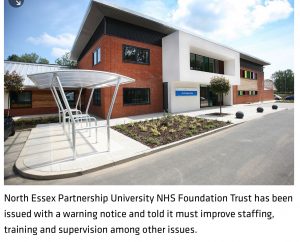
North Essex Partnership University NHS Foundation Trust has been issued with a warning notice and told it must improve staffing, training and supervision among other issues.
The mental health trust was told to make immediate improvements following an unannounced inspection of its acute inpatient services by the Care Quality Commission in September.
Inspectors found wards were not fully staffed, with shifts left unfilled and that staff were not receiving regular clinical supervision or training.
All wards had nursing staff vacancies and were using bank and agency staff with no permanent nursing staff on duty on several occasions.
For example, according to rotas, there were no permanent staff on duty in the psychiatric intensive care unit for two nights in a row in August.
In addition, inspectors found the trust was not meeting mandatory training targets. “This meant not all staff had received the required level of refresher training,” said the CQC’s report.
The inspection team also found variation in staff supervision, with compliance rates dipping as low as 12% on one acute ward. Meanwhile, no supervision took place on another acute ward throughout April and May, according to the trust’s own records.
Other concerns centred on learning from incidents, safeguarding and the involvement of patients and carers in care decisions.
The CQC latest visit followed an inspection of the whole trust by the regulator in August last year, when it was rated “requires improvement” overall.
The CQC’s chief inspector of hospitals, Professor Sir Mike Richards, said improvements had been made but more work was needed.
“We could see that much work had been done since our visit in August 2015 and that there were a number of areas of good practice at the trust,” he said. “The majority of patients gave positive feedback about their care.
“However, we were concerned that improvements were needed in a number of areas,” he said. “This included the trust’s assessment and management of risks for fixed ligature points on wards, there were concerns relating to the provision of segregated accommodation for men and women and learning from incidents needed to be shared with staff.”


Leave a Reply
You must be logged in to post a comment.